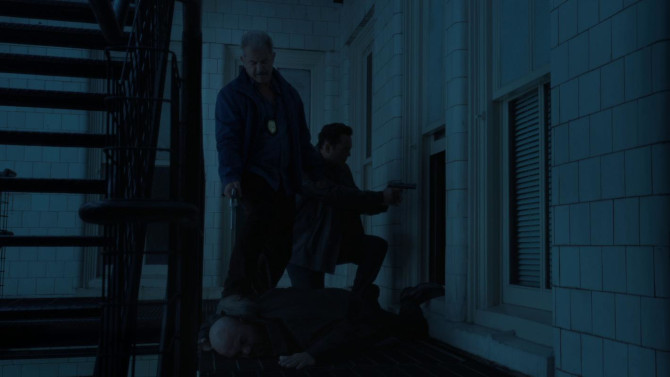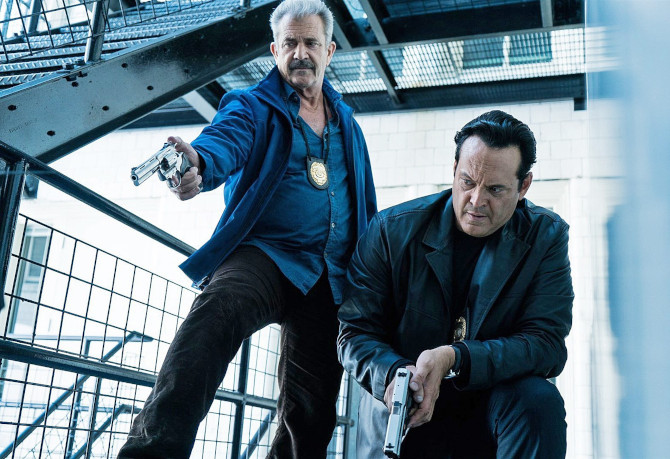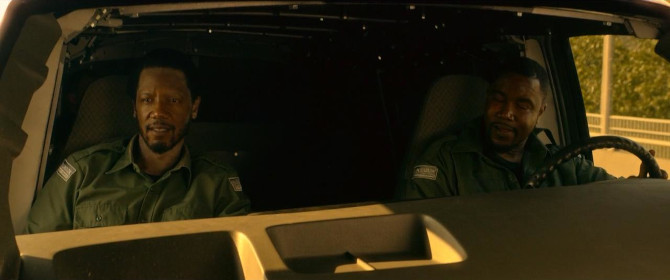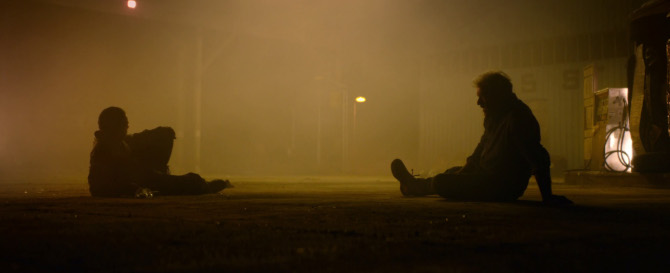Brett Ridgeman: “For a lot of years I believed that the quality of my work, what we do together, what I did with my previous partners. . . would get me what I deserved. But I don’t politic and I don’t change with the times, and it turns out that shit’s more important than good honest work. So yesterday, after we stop a massive amount of drugs from getting into the school system, we get suspended because we didn’t do it politely.”
A tale of its time, writer/director S. Craig Zahler (Bone Tomahawk; Brawl in Cell Block 99), takes us into dangerous terrain. . . no, not some bloody wartime feature or psychotic mystery/thriller, but rather into the realm of conservative and liberal, cops and criminals, race and racism, preconceived notions, and cancel culture, with his 2018 film Dragged Across Concrete.
If you’ve seen Zahler’s previous efforts, you’ll likely know what to expect – fantastic, if lengthy dialogue (with a very specific and unique rhythm), combined with shocking moments of violence. Almost written more like a novel than a screenplay, it is a fascinating study. . . but more on that later.
Following two cops, aging detective Brett Ridgeman (Mel Gibson) and the younger Anthony Lurasetti (Vince Vaughn – who introduced Gibson to the project while they were working together on Hacksaw Ridge), Lethal Weapon this is not. . . though they might be getting too old for this shit. After busting a seedy criminal drug dealer (who has been selling his product to school age kids), the pair are reprimanded after a complaint (which is accompanied by a video) – the quotation that opens this piece comes into play at this point.
Deemed excessive (which you might agree with), it leads to a frank discussion with their superior officer, Chief Lt. G. Calvert (Don Johnson) – Ridgeman’s former partner. A man who knows how to play the game, he is like a mirror image of Ridgeman – very much the same, but somehow the utter opposite. Making claims that they are losing their direction and compassion whilst in the line of duty, as well as suggesting that there may be a racist component to their behaviour – something Lurasetti vehemently denies, “but I’m not racist. Every Martin Luther King Day, I order a dark roast”, the Chief Lt. is forced to suspend them for eight weeks – without pay.
Placing the pair in a most difficult situation, Ridgeman is desperately trying to make enough money to move his family out of their slowly worsening neighbourhood, as his wife Melanie (Laurie Holden), who has Multiple Sclerosis, and daughter Sara (Jordyn Ashley Olson), who has been assaulted five times in the streets, need a safer place to live; while Lurasetti, despite his measly pay, has just purchased an engagement ring in order to propose to his girlfriend, Denise (Tattiawna Jones).
Unlike other movies that would develop prototypical antagonists, Zahler introduces us to Henry Johns (Tory Kittles), a man who has just been released from jail. Returning home to find his mother hooking and crippled brother stuck in a near inhospitable abode, his past life comes calling once more by way of childhood friend Biscuit (Michael Jai White) – who has an interesting, if dangerous proposal. Intriguingly, Zahler never paints these two with a villainous brush, just ordinary people in desperate times. . . much like the cops who are now without pay.
There are also two other minor storylines that converge, one featuring some psychotic killers who might be linked to a drug dealer, Lorentz Vogelmann (Thomas Kretschmann), who the cops begin to investigate (hoping to make some sketchy money while off duty), and the other, a mother, Kelly Summer (Jennifer Carpenter), struggling to go back to work (at a bank) and leave her snuggly baby at home. Again, like something from a novel, this side story is wonderfully etched out, a fully developed character that finds her way into the narrative in a most unexpected way. It is not something often seen in film, and it is likely a moment few will forget after seeing this picture.
A slow burner with a title that speaks the truth (by the end of the film, it will feel like you’re raw to the bone), Zahler relishes in building his characters over its lengthy two hour and thirty eight minute runtime. Despite Ridgeman being more desperate (and perhaps less book smart than Lurasetti), his partner ends up going along with the idea. . . quickly getting entrenched in the mysterious and clearly crooked case. Often centred on their very human interactions during their lengthy stakeouts, be it in banter in relation to annoyances over how the other eats, or Ridgeman’s streetwise percentage analysis of every situation they get into, these moments help us understand exactly who these people are. By way of this slow build, we watch as these characters, who probably wouldn’t usually be classified as bad, get into increasingly ‘bad’ situations, forcing us to reappraise our initial thoughts on these two slightly overzealous cops.
Equally as thought provoking is Zahler’s discussion on the above mentioned topics of conservative and liberal, cops and criminals, race and racism, preconceived notions, and cancel culture. These two very conservative cops have not evolved with the times, two blunt instruments in an increasingly soft world. Their processes, be it thought or action, do not compute with this new world, and, in many ways, the script almost seems like it is self-referentially talking about Gibson himself (another layer to this piece). Again, painted in a way that is not black or white, Zahler never provides any answers himself, instead thriving on forcing his audience to absorb the material and make up their own minds on these touchy subjects. The Johns and Biscuit personas provide their own cruxes, two seemingly moral and decent individuals who have been dealt a bad lot in life and have looked for answers within it instead of finding a more honest path. The morally complex ending will again muddy the waters for viewers trying to wrap their heads around the subject. Here is just one example of what I’m talking about: “There’s certainly nothing hypocritical about the media handling every perceived intolerance with complete and utter intolerance”.
Another quality piece of cinema from S. Craig Zahler (in fact, he also wrote all of the songs heard in the movie as well), Dragged Across Concrete is a visual and narrative marvel. With a cold, earthy colour palette of browns, blacks, blues, and yellows, as well as some shocking moments of violence (arguably unlike anything seen before), these visual touches match the story found on paper, making for a complicated and complex moral conundrum of a picture. A final worthy note, look for a cool cameo from the great Udo Kier. So, see this hidden gem of a motion picture, it’s worth its weight in gold. . . though it is up to you to discover whether it’s fool’s gold.




